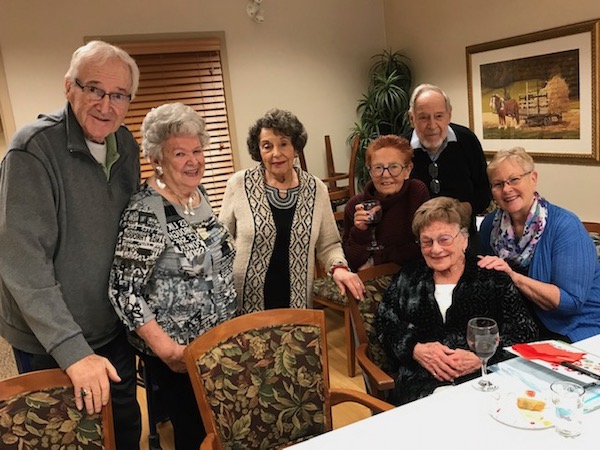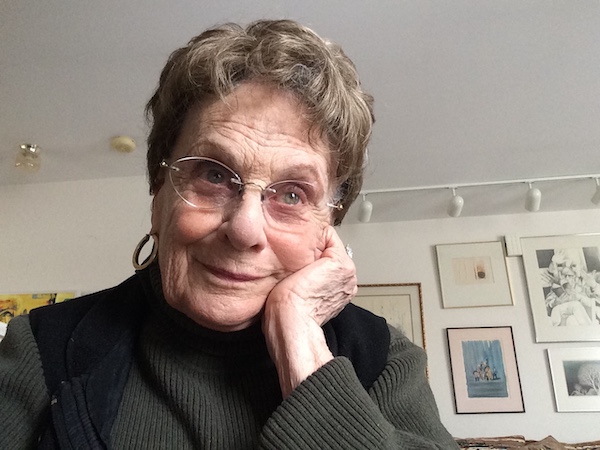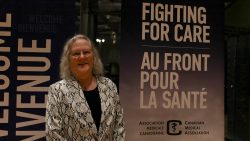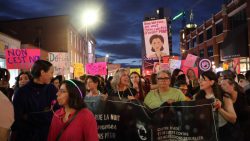Elaine Wiseman is among the older adults in group living centres for seniors who has received both doses of a COVID-19 vaccine, getting her first shot on March 5, two days after her 91st birthday. The last year has been particularly socially isolating for Wiseman because of the pandemic, she says, and the vaccine has given her hope for a renewed sense of normalcy.
“I really would love to go to a few places and, you know, it would be wonderful to see friends again,” she said.
About 40 per cent of the Canadian population has received at least one vaccine dose against COVID-19, according to data collected by the Government of Canada. Among elderly Canadians, the numbers are much higher, with more than 85 per cent of those over the age of 70 having received at least one dose, according to the same data.
Early data is pointing to the mental-health implications of COVID-19 on Canadians, with 56 per cent indicating increased stress and anxiety, according to a poll conducted by IPSOS. Canadians aged 55 and older reported below average anxiety levels of 46 per cent, however there was no data specifically referencing older adults in long term or retirement homes.
In fact, “approximately 10 per cent of older adults living in the community and up to 40 per cent living in long-term care settings will have significant levels of depression,” according to Sunnybrook Health Sciences Centre. The Canadian Academy of Geriatric Psychiatry also concludes in a recent report that “mental health care is an essential medical service that must be maintained during any pandemic” for older adults living in long-term care.
Social isolation has long been an area of concern for gerontologists, even before the pandemic began, says Dr. Rebecca Genoe, associate professor in the faculty of Kinesiology and Heath Studies at the University of Regina. Genoe’s research focuses on leisure and aging as well as dementia, specifically looking at how that how leisure activities can benefit people who are living with memory loss, she says.
“I think that [COVID-19] is exacerbating the trend of social isolation that was underway in our society. I think that maybe the public is more aware of it now and maybe looking out for their older family members a little bit more,” Genoe said. “But it’s hard to say without a crystal ball what will change in the future as a result of COVID.”

Genoe describes social isolation as an objective measure of the number of contacts someone has. But loneliness is more subjective. If someone has few contacts, they might be considered socially isolated, she says. But if someone has several contacts and feels those relationships are of poor quality, they might describe that as being lonely.
“Someone could be socially isolated, and lonely. Or they could be one or the other,” said Genoe. “A really important component of all of our lives, including older adults, is a sense of belonging and being a part of our communities and access to services like leisure,” she says.
Visiting the library, socializing with one’s church community or going to a physical fitness class are important social interactions that are valuable for our lives, says Genoe.
“So not being able to access that can really change someone’s day.”
With Wiseman’s vaccination, this birthday marked a different celebration than last, which she celebrated alongside her children and grandchildren who flew in from out of town just prior to the first lockdown. In early March 2020 Wiseman also enjoyed quality time with her poetry group at her retirement home, her favourite creative pastime, she says.
“We started a poetry club here. And that has been wonderful, except that a few people have passed away, and they were key people,” she said.
Prior to the formation of the poetry club, Wiseman had missed dabbling in the creative arts as they had become increasingly difficult due to her limited sight. And while the club has been out of operation for the last several months, Wiseman has gotten the go ahead to start up again in April.
“We’ll see what we can do from there,” she said. “But to me, I lived for those programs, because those were important to me, and kept me happy.”
Wiseman has lived at the Shaftesbury Park Retirement Residence in Winnipeg for nearly five years and has felt safe and comfortable in the space during the pandemic.
“They’ve been very diligent here; I have to commend them. They’ve been excellent. This place has been really, really excellent as far as keeping people away and doing what they’re supposed to do and trying to make programs that keep a lot of people busy and at the same time, not close together.”
When residents were confined to their rooms at the beginning of the pandemic, staff at Wiseman’s home came around with snacks and puzzle sheets as a means of engagement. “They were stimulating to a degree and they gave little prizes for various things,” she said.
Once protective measures were put in place and residents could leave their rooms, they were encouraged to get moving physically.
“They had little searches for different holidays. On the 17th of March they had a little leprechaun, and they would hide it on one of the floors here to get people to walk in the halls,” she said. “And that seemed to get a lot of people out and doing things. They were fairly creative.”
Wiseman was also able to use her floor’s treadmill during the lockdown, and is still using it every day, noting that exercise is very important to her.
The consequences of isolation
There have been a number of consequences of isolation, says Dr. Diane Ducas, with perhaps the biggest being a sense of anxiety amongst her patients. Ducas is an associate professor of psychiatry at the University of Manitoba department of medicine with a subspecialty in geriatric psychiatry.
“There’s no question there have been changes [in patients]. And really, it was and has been as a consequence of isolation and anxiety for many levels. So, they could have had anxiety difficulties before, but it would get amplified with fear of the virus.”
The sheer fear of the virus has affected the mental health of some of her geriatric patients, says Ducas.
“I’ll paint a picture for you,” Ducas said. “Many of the people that we follow are widowed and living alone. And they are living in assisted living facilities not so different from the Shaftesbury. In these buildings, all the usual activities were stopped [including] dining rooms, where people will go and mingle and socialize, and whatever,” she said.
“So you can imagine the consequence of all that isolation. The only connection they had was the telephone, the odd visit. And that changed at different points, depending upon how much lockdown we were in.”
“It [contracting the virus] would have been a nightmare for them,” Ducas said. “I certainly have encountered some that have ended up going into hospital for another reason and getting COVID while they were in there. The fear factor was tremendous.”
During this challenging time, there has been an effort to combat the isolation of the elderly, says Ducas, referencing the Student-Senior Isolation Prevention Partnership (SSIPP). SSIPP “is a national initiative partnering health professional students to visit older adults in the community – or during COVID-19, to call older adults weekly, to provide social comfort and connection,” according to their website. Their mission is “to mitigate the social isolation of older adults by building a society that promotes their well-being, while enabling them to feel valued and remain socially connected.”
Throughout the pandemic, Wiseman has kept up with her treadmill routine, engaging mental stimuli and plenty of time in her kitchen — our interview was conducted under the condition she could be done soon to continue with her baking of the day. She talks to her children on the phone once or twice a day, she says. FaceTime has also been a huge part of her routine, especially in relation to her two smallest grandchildren, aged eight and 10.
“I can speak to them and watch them do their dances or their drawings — or whatever it is — and communicate that way, which has been wonderful.”

Still, the pandemic and its restrictions left her feeling socially isolated at times.
“More so from my family than anything else. And my friends, and being able to get out and go with somebody for lunch or go out for dinner. The things that you do socially that make you happy. Yes, I missed all that, I did very much so,” said Wiseman.
Talking to family and friends on the phone became her new social life, she says.
“I’ve always kind of been a self-starter, so I can try my best to, you know, whatever the situation try to work it out.”
Even with her positive attitude, Wiseman admits her mental health has been affected negatively but she is determined to push through it to enjoy lighter days ahead, she says.
“Does it [isolation] affect how you feel? Of course it does,” she said. “But you want to be with them [your family] again. So you can’t let yourself go that way, you got to handle it.”
With Wiseman, you can expect a joke to be made about even the grimmest of situations, she laughs.
“Thank God for humor because that gets me through my life.”




